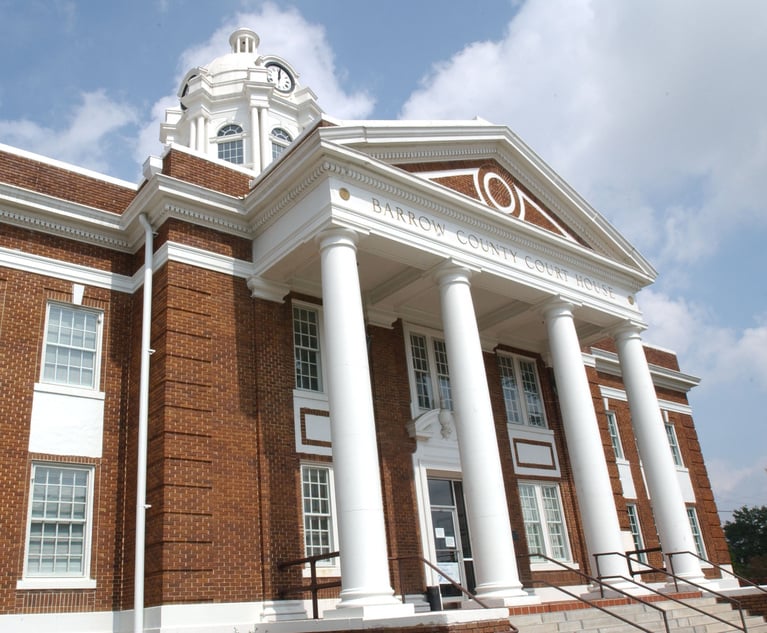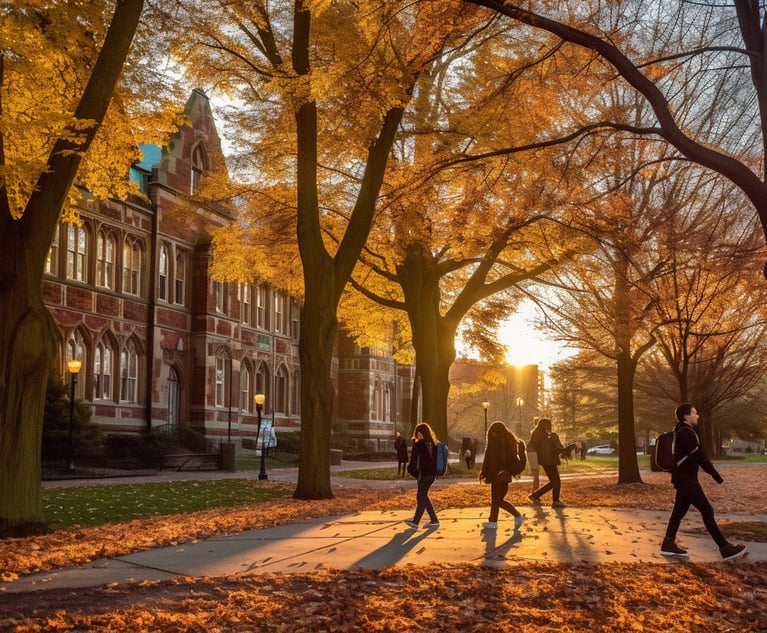John Marshall Professor Responds to Savannah Law Alum's 'Outburst'
The “ugly stepsister” insult denigrating that expertise—delivered by someone monumentally unqualified to make such a judgment and yet nevertheless blithely included in your article—should fall below your editorial standards.
March 30, 2018 at 03:23 PM
7 minute read

In your March 28th article, “Law Students and Alums Seek to 'Save Savannah' from Closing,” you quoted Constance Cooper, a Savannah Law School alum, to cast aspersions on the faculty of Atlanta's John Marshall Law School: “Cooper said the quality of [Savannah's] faculty also sets it apart … 'When you look at the quality of the education we have, and you compare it to Atlanta's John Marshall, it's laughable … We are as similar to Atlanta's John Marshall as Cinderella is to an ugly stepsister.'”
This tenuous attempt of reasoning by analogy can be discounted as an isolated outburst, born of ignorance and pique. What cannot as easily be dismissed, however, is the willingness of the Daily Report to use its substantial platform to publicize far and wide such a casual slander against an entire faculty from a person who went to a different school over 250 miles away. As a faculty member of John Marshall for over 10 years, the respect for my colleagues compels me to respond.
Collectively, the faculty of John Marshall Law School is one of profound distinction. Among us, there is a MacArthur Foundation Genius Fellow, a recipient of the Elbert D. Tuttle Jurisprudence Award for Lifetime Achievement, and a Soros Justice Fellow. We've chased learning our whole lives and attended some of the world's leading institutions: Princeton, Columbia, Chicago, Cornell, Dartmouth, Virginia, the London School of Economics, Duke, Texas, Northwestern, Michigan, UNC, Wisconsin, Emory, George Washington, Boston College, Washington & Lee, Spelman, Union College, UGA, Washington University, Georgetown.
Our scholarly output is both prolific and relevant, finding homes in a national cross-section of leading law journals: Cornell Law Review, Michigan Law Review, Harvard Law and Policy Review, Harvard Journal of Law and Public Policy, North Carolina Law Review, Texas Law Review, Wisconsin Law Review, University of Pennsylvania Journal of Law and Social Change, Washington and Lee Law Review, Iowa Law Review, Journal of College and University Law, Berkeley Business Law Journal, Alabama Law Review, Southern Cal Interdisciplinary Law Journal, Cornell Journal of Law and Public Policy. That is just a small sampling.
In an era where many decry the divide between the practice of law and the work of legal academics, the eagerness of courts to cite our work in judicial opinions highlights the meaningfulness of what we write. The United States Supreme Court has cited the work of two of our professors. Judges serving in the United States Circuit Courts of Appeals for the Fifth, Sixth, Seventh (Judge Richard Posner, no less), and Eleventh Circuits have relied on our scholarship. Federal district courts and state appellate courts from Massachusetts to California—and covering every time zone in-between—have verified the value of our work in their opinions.
Our impact in the broader legal world is not limited to scholarly commentary. Our media footprint includes the New York Times, CNN International, Fox Business Channel, NPR, GPB Radio, the AJC, the Huffington Post, WPBA, TED talks, and an award-winning HBO documentary featuring the fight for social justice by a non-profit formed by one of our number.
Through our scholarship, teaching, and media appearances, our work has found a landing spot on every continent of the globe, except Antarctica.
Many law faculties, however, can claim similar accomplishments. What makes us different is the depth and breadth of our practice experience.
We've worked as partners or associates at most of the leading law firms in Atlanta: King & Spalding; Troutman Sanders; McKenna, Long, & Aldridge; Kilpatrick Stockton, Powell Goldstein; Paul Hastings; Jones Day; Nelson Mullins; Arnall, Golden, & Gregory. We've advocated for justice at leading civil rights firms like Parks, Chesin, & Miller, been certified as plaintiffs' class counsel in multiple class actions by both federal and state courts, decided disputes as arbitrators, and settled disputes as mediators. Fairly unique among law schools, we also have faculty with substantial in-house experience, working at corporate giants like Georgia Pacific Corporation and Kimberly-Clark Corporation.
This vast litigation and transactional experience only tells half the story. A legacy of public service completes the picture. Our ranks include a head of the Civil Rights Division of the U.S. Department of Justice, the inaugural director of the Georgia Public Defenders Standards Council, the training chief for the Orleans Public Defenders, and the chief of litigation for the State of Yap of the Federated States of Micronesia. We've served as child advocates in the juvenile courts, provided a defense to the indigent, represented Georgia in the Attorney General's Office, secured fair housing at the Atlanta Housing Authority, shaped health care policy in the U.S. Department of Health and Human Services, advanced the cause of workers with the National Labor Relations Board, served the interests of rural Americans at the Tennessee Valley Authority, and worked to save the lives of the condemned in the capital habeas unit of the Office of the Federal Public Defender.
Indeed, based on our significant history of criminal defense work, I suspect our full-time faculty has more jury trials under our belt than all the other law schools of Georgia combined. At most law schools, significant practice experience actually counts against you come hiring time; the belief is that practicing law for any extended period betrays a lack of seriousness for the scholarly enterprise. We go against the grain. We were accomplished lawyers long before ever setting foot in a classroom, and the “ugly stepsister” insult denigrating that expertise—delivered by someone monumentally unqualified to make such a judgment and yet nevertheless blithely included in your article—should fall below your editorial standards.
Our proudest professional accomplishments, however, are not our own, but the fruit produced by those who put their legal education in our hands. Every day John Marshall lawyers battle in the trenches to change lives through the practice of law. I read about their successes in the pages of the Daily Report, follow the upward trajectories of their careers on Facebook, see firsthand the impact of their activism through the community organizations they serve, burst with pride when the big firms that wouldn't hire them out of law school hire them as laterals, and marvel at the expanding roots of the alumni base when the graduates of 5-10 years ago—who now have successful law firms all their own–pay it forward by employing the graduates of today, an occurrence happening with remarkable regularity. I even see a 2008 graduate on television from time to time because he serves in the United States Congress. Hoping to join him, a 2013 graduate—who immigrated to this country at the age of 12 to escape political persecution—is also running for Congress this year.
We are a non-traditional faculty at a non-traditional school with non-traditional students. An opportunity law school, we call it. Challenges abound. Not everyone makes the most of the opportunity. At the end of the day, however, the thousands of former John Marshall students now practicing law because we were the only school that would give them a chance bears witness to the continuing fulfillment of our mission.
Through them, John Marshall Law School makes the legal profession more diverse, more egalitarian, and more just.
Lance McMillian
Associate Professor
Atlanta's John Marshall Law School
This content has been archived. It is available through our partners, LexisNexis® and Bloomberg Law.
To view this content, please continue to their sites.
Not a Lexis Subscriber?
Subscribe Now
Not a Bloomberg Law Subscriber?
Subscribe Now
NOT FOR REPRINT
© 2025 ALM Global, LLC, All Rights Reserved. Request academic re-use from www.copyright.com. All other uses, submit a request to [email protected]. For more information visit Asset & Logo Licensing.
You Might Like
View All
From 'Confusing Labyrinth' to Speeding 'Roller Coaster': Uncertainty Reigns in Title IX as Litigators Await Second Trump Admin
6 minute read
University of Georgia School of Law Finds Next Dean on Its Own Faculty
3 minute read
Teen Charged in Barrow School Shooting and His Father to Stay in Custody After Hearings
5 minute readTrending Stories
Who Got The Work
J. Brugh Lower of Gibbons has entered an appearance for industrial equipment supplier Devco Corporation in a pending trademark infringement lawsuit. The suit, accusing the defendant of selling knock-off Graco products, was filed Dec. 18 in New Jersey District Court by Rivkin Radler on behalf of Graco Inc. and Graco Minnesota. The case, assigned to U.S. District Judge Zahid N. Quraishi, is 3:24-cv-11294, Graco Inc. et al v. Devco Corporation.
Who Got The Work
Rebecca Maller-Stein and Kent A. Yalowitz of Arnold & Porter Kaye Scholer have entered their appearances for Hanaco Venture Capital and its executives, Lior Prosor and David Frankel, in a pending securities lawsuit. The action, filed on Dec. 24 in New York Southern District Court by Zell, Aron & Co. on behalf of Goldeneye Advisors, accuses the defendants of negligently and fraudulently managing the plaintiff's $1 million investment. The case, assigned to U.S. District Judge Vernon S. Broderick, is 1:24-cv-09918, Goldeneye Advisors, LLC v. Hanaco Venture Capital, Ltd. et al.
Who Got The Work
Attorneys from A&O Shearman has stepped in as defense counsel for Toronto-Dominion Bank and other defendants in a pending securities class action. The suit, filed Dec. 11 in New York Southern District Court by Bleichmar Fonti & Auld, accuses the defendants of concealing the bank's 'pervasive' deficiencies in regards to its compliance with the Bank Secrecy Act and the quality of its anti-money laundering controls. The case, assigned to U.S. District Judge Arun Subramanian, is 1:24-cv-09445, Gonzalez v. The Toronto-Dominion Bank et al.
Who Got The Work
Crown Castle International, a Pennsylvania company providing shared communications infrastructure, has turned to Luke D. Wolf of Gordon Rees Scully Mansukhani to fend off a pending breach-of-contract lawsuit. The court action, filed Nov. 25 in Michigan Eastern District Court by Hooper Hathaway PC on behalf of The Town Residences LLC, accuses Crown Castle of failing to transfer approximately $30,000 in utility payments from T-Mobile in breach of a roof-top lease and assignment agreement. The case, assigned to U.S. District Judge Susan K. Declercq, is 2:24-cv-13131, The Town Residences LLC v. T-Mobile US, Inc. et al.
Who Got The Work
Wilfred P. Coronato and Daniel M. Schwartz of McCarter & English have stepped in as defense counsel to Electrolux Home Products Inc. in a pending product liability lawsuit. The court action, filed Nov. 26 in New York Eastern District Court by Poulos Lopiccolo PC and Nagel Rice LLP on behalf of David Stern, alleges that the defendant's refrigerators’ drawers and shelving repeatedly break and fall apart within months after purchase. The case, assigned to U.S. District Judge Joan M. Azrack, is 2:24-cv-08204, Stern v. Electrolux Home Products, Inc.
Featured Firms
Law Offices of Gary Martin Hays & Associates, P.C.
(470) 294-1674
Law Offices of Mark E. Salomone
(857) 444-6468
Smith & Hassler
(713) 739-1250







